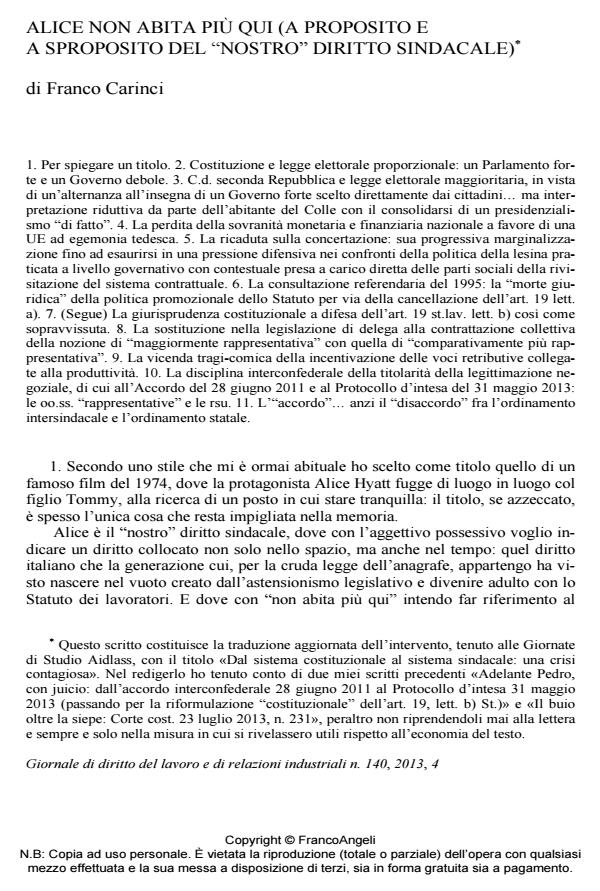Alice non abita più qui (a proposito e a sproposito del "nostro" diritto sindacale)
Journal title GIORNALE DI DIRITTO DEL LAVORO E DI RELAZIONI INDUSTRIALI
Author/s Franco Carinci
Publishing Year 2013 Issue 2013/140
Language Italian Pages 22 P. 665-686 File size 315 KB
DOI 10.3280/GDL2013-140008
DOI is like a bar code for intellectual property: to have more infomation
click here
Below, you can see the article first page
If you want to buy this article in PDF format, you can do it, following the instructions to buy download credits

FrancoAngeli is member of Publishers International Linking Association, Inc (PILA), a not-for-profit association which run the CrossRef service enabling links to and from online scholarly content.
Collective labour law, freezed as it is within classical labour law handbooks, is changing to the total loss of its original profile. This change is due to the institutional pressure of a "de facto" presidentialism and to an increasing EU control, up to the limit of an authentic expropriation of any chance of intervention, not just monetary, but even financial, with the consequent end of the consultation practice. At the same time, the 1995 Referendum, while cancelling art. 19, let. a, of the "Statuto dei lavoratori", swept away the promotional policy of the "Statuto", the so-called delegated bargaining being a sort of expansion of it; moreover, the Referendum forced the Constitutional Court to a defense, so strenuous as inconsistent, of art. 19, let. b, of the "Statuto dei lavoratori", extended to firm-level collective bargaining, and, what is more, destined not to survive to the crisis of Trade Union unity of the end of the first decade of this century. The unitary regulation introduced by the June 2011 Collective Agreement and by the May 2013 Protocol tried to launch a self-sufficient and omni-inclusive bargaining system, based on Unions which were representative at the sector-level for reaching the predetermined threshold of 5%, and on the "RSU" at firm-level. But, regardless of its state of implementation, it has internal inconsistencies, making it only partially suitable for attaining the objective pursued of an effective coverage of all workers at all level. Therefore, especially after the Constitutional Court ruling n. 231/2013, you just have to call upon a legislative intervention.
Keywords: Collective Labour Law; Constitution; Electoral Law; Contractual System; Concertazione; Representativeness.
- I diritti sociali alla prova della crisi: l'Italia nel quadro europeo Stefano Giubboni, in GIORNALE DI DIRITTO DEL LAVORO E DI RELAZIONI INDUSTRIALI 142/2014 pp.269
DOI: 10.3280/GDL2014-142004 - Opinioni sul "nuovo" art. 19 dello statuto dei lavoratori Franco Liso, Mariella Magnani, Riccardo Salomone, in GIORNALE DI DIRITTO DEL LAVORO E DI RELAZIONI INDUSTRIALI 141/2014 pp.105
DOI: 10.3280/GDL2014-141005
Franco Carinci, Alice non abita più qui (a proposito e a sproposito del "nostro" diritto sindacale) in "GIORNALE DI DIRITTO DEL LAVORO E DI RELAZIONI INDUSTRIALI " 140/2013, pp 665-686, DOI: 10.3280/GDL2013-140008